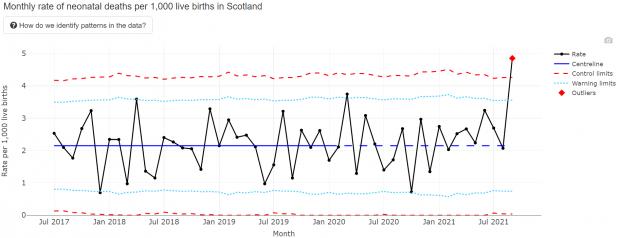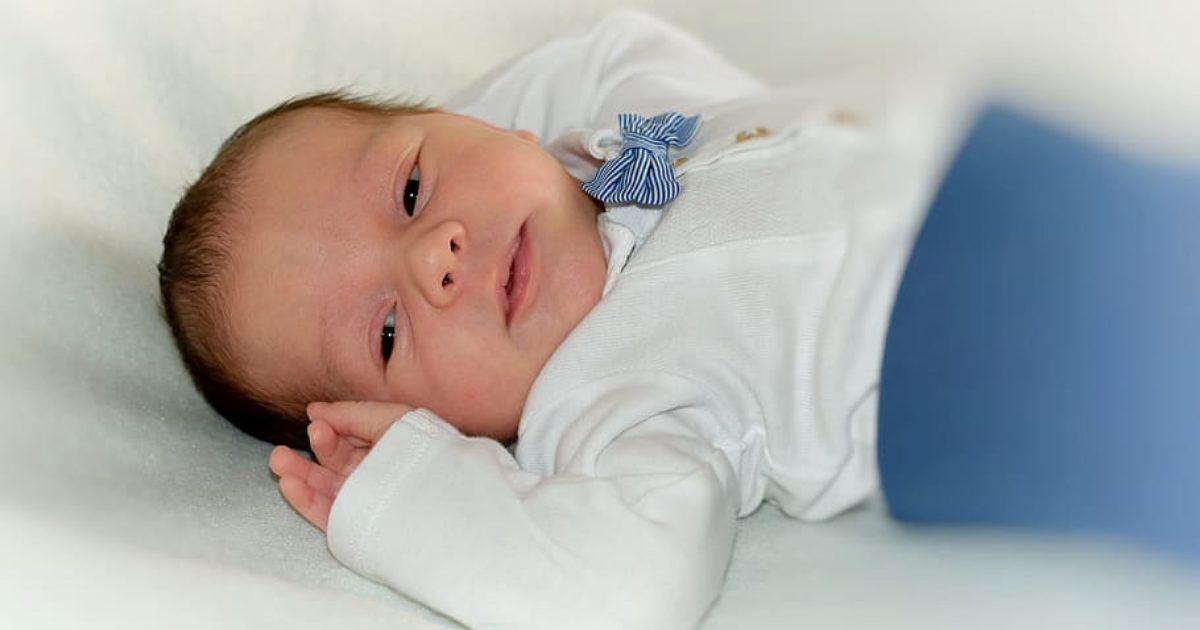An alarming trend arose in Scotland during September.
According to official figures, 21 infants died within 28 days of birth.
In September, Scotland’s neonatal mortality rate was 4.9 per 1,000 live births.
While the numbers tend to fluctuate month to month, September’s rate reached levels that warrant immediate concern from health officials.
The rate eclipsed a warning threshold known as the ‘control limit’ for the first time in at least four years.

Even more frightening, Scotland hasn’t seen a neonatal mortality rate of this magnitude since the late 1980s.
While public health officials have shown previous concern on COVID-19’s impact on neonatal deaths, September 2021 is the first month with such an alarming figure.
That raises an obvious question for this abnormal spike in neonatal mortality.
How many of the 21 infant deaths in Scotland during September were from mothers injected with the experimental COVID-19 shots?
BBC: "Investigation into spike in newborn baby deaths in Scotland"
…
Deaths of newborn babies have fallen steadily in recent decades with the mortality rate per 1,000 births dropping from double figures in the 1970s to 2.1 in 2020."https://t.co/DOAwscrOg4 pic.twitter.com/p7p1lnJyHl— Ari V 🇨🇦 ✊🔎🌸 #MassFormationPsychosis resister (@ReasonOverDogma) November 23, 2021
A spike in the number of deaths of newborn babies in Scotland is to be investigated. At least 21 babies under four weeks old died in September, a rate of 4.9 per 1,000 births. The increase is larger than expected from chance alone. https://t.co/VB4g66vP1P pic.twitter.com/hJFxZwXeBD
— Sander (@Sander_2021) November 23, 2021
Investigation launched into abnormal spike in newborn baby deaths in Scotland https://t.co/PCuKGUKHNb
— Gareth Icke (@garethicke) November 23, 2021
https://twitter.com/eileeniorio/status/1462801754723074052
As reported in The Herald:
Public Health Scotland (PHS), which is one of the bodies currently investigating the spike, said the fact that the upper control limit has been exceeded “indicates there is a higher likelihood that there are factors beyond random variation that may have contributed to the number of deaths that occurred”.
PHS said it is working with the Scottish National Neonatal Network, the Maternity and Children Quality Improvement Collaborative and the Scottish Government “to understand any possible contributing factors to the most recent infant mortality patterns, and to incorporate findings into existing prevention and improvement work”.
Monthly figures on neonatal death rates are only available up to July 2017, but previously peaked at 3.7 per 1000 lives births in March 2020.
Annual statistics on neonatal mortality published by the National Records of Scotland show that it has been in steady decline for decades, falling from an average of 4.7 per 1000 live births in 1986-1990 to 2.2 per 1000 by 2016-2020.
Worldwide, the most common causes of neonatal death are infection, prematurity, and suffocation, but factors such as smoking during pregnancy or disruption to early intervention services including health visiting and midwifery also increase the risk.
PHS notes on its website that it “is important to monitor the levels of stillbirth and infant mortality during the Covid-19 pandemic, as they may be influenced by maternal health and wellbeing, by how maternity services are provided, and how people seek and interact with care”.
The Herald listed several potential causes of the rise in neonatal mortality:
-An unseasonal spike in respiratory syncytial virus (RSV)
-Pre-term deliveries caused by COVID-19 infections in expectant mothers
-Increased pressure on health services
However, it’s stated none of the deaths were directly linked to COVID-19 and that Scotland recorded its lowest number of neonatal deaths in 2020.
What explains the dramatic increase of neonatal deaths in September 2021 since the “pandemic” first started in 2020?
What’s the difference between 2020 and 2021?
The answer is self-explanatory.
The mainstream media doesn’t want to hint at the possibility of the abnormal spike resulting from pregnant women who’ve had the COVID-19 jabs.
Unsurprisingly, the BBC avoided asking that critical question:
PHS said there was “currently no indication of links between these deaths and Covid-19 infection” although the data will be examined further.
Pre-term deliveries
Dr Sarah Stock, an expert in maternal and fetal health at University of Edinburgh, said it was rare for newborn babies to become infected or seriously-ill with Covid but she said the virus could be having an impact in other ways.
“We know, for instance, that when pregnant women have Covid they can become seriously unwell, and in order to protect the mother and baby that can lead to pre-term deliveries,” she said. “Pre-term delivery is the biggest driver of neonatal mortality.
“We also know that the pandemic has put a lot of pressure on health services and that could be having an impact.”
PHS is now working with the Scottish National Neonatal Network , the Maternity and Children Quality Improvement Collaborative and the Scottish government to understand possible contributing factors.
Figures for the number of stillborn babies also increased in September but not beyond the upper warning or control limit.
Deaths of newborn babies have fallen steadily in recent decades with the mortality rate per 1,000 births dropping from double figures in the 1970s to 2.1 in 2020.
Could this abnormal spike in Scottish neonatal deaths be similar to reports of increased stillbirths in Canada?
Until we know the vaccination status of these mothers, it can’t be ruled out.



Join the conversation!
Please share your thoughts about this article below. We value your opinions, and would love to see you add to the discussion!